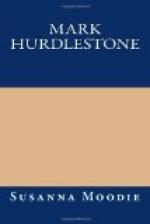Godfrey nodded his head.
“It is well,” said Anthony, bitterly. “You have saved your own life by transferring the doom to me.”
He did not wait for further explanation, but walked rapidly from the house; and after a thousand severe self-upbraidings, in a fit of despair, took the road that led through Ashton Park to the miser’s dwelling.
After an hour’s walk he came in sight of the wretched hovel. It was now evening, and a faint light, shed from a rush candle, gleamed through the broken apertures of the low casement. He paused upon the threshold of this abode of want and misery, and for the first time in his life he thought it had been well for him had he never left it. For some time he continued knocking loudly at the door, without being able to gain admittance; at, length, bolt after bolt was slowly withdrawn, and the miser himself let him in.
“It is well, Grenard, that you are home at last,” growled forth the surly old man. “If you make a practice of staying out so late at night, we shall both be murdered.”
But when, on holding up the light, he discovered his mistake, and recognised the features of his son, he demanded in an angry tone, “What business he had with him?”
Anthony pushed past him, and entered the house.
“Father, I will tell you immediately—but I am tired and ill. I must sit down.”
Without regarding the old man’s stern look of surprise and displeasure, he advanced to the table, and sat down upon the empty bench which was generally occupied by Grenard Pike, secretly rejoicing that that worthy was not at home. The awkwardness and difficulty of his situation pressed so painfully upon the young man, that for a few seconds he could not utter a word. A cold perspiration bedewed his limbs, and his knees trembled with agitation.
Stern and erect, the old man, still holding the light, stood before him, and though he did not raise his head to meet the miser’s glance, he felt that the searching gaze from which he used to shrink when a boy was riveted upon him.
Mark Hurdlestone was the first to break the awful silence.
“Well, sir! If you are ready to explain the cause of this extraordinary visit, I am ready to listen to you. What do you want?”
“Your advice and aid,” at length gasped forth the unhappy youth. “I have acted very foolishly, and in an hour of great difficulty and danger, I fling myself upon your mercy, and I beseech you not to turn a deaf ear to my prayer.”
Mark sat down in his high-backed chair, and placed the light upon the table in such a manner as fully to reveal the pale agitated features of his son. Had a stranger at that moment entered the cottage, he might for the first time have perceived the strong family likeness that existed between them. The same high features, the same compressed lips and haughty stern expression of eye. The gloom which overspread the countenance of the one, produced by the habitual absence of all joyous feeling; the other by actual despair. Yes, in that hour they looked alike, and the miser seemed tacitly to acknowledge the resemblance, for a softening expression stole over his rigid features as he continued to gaze upon his son.




